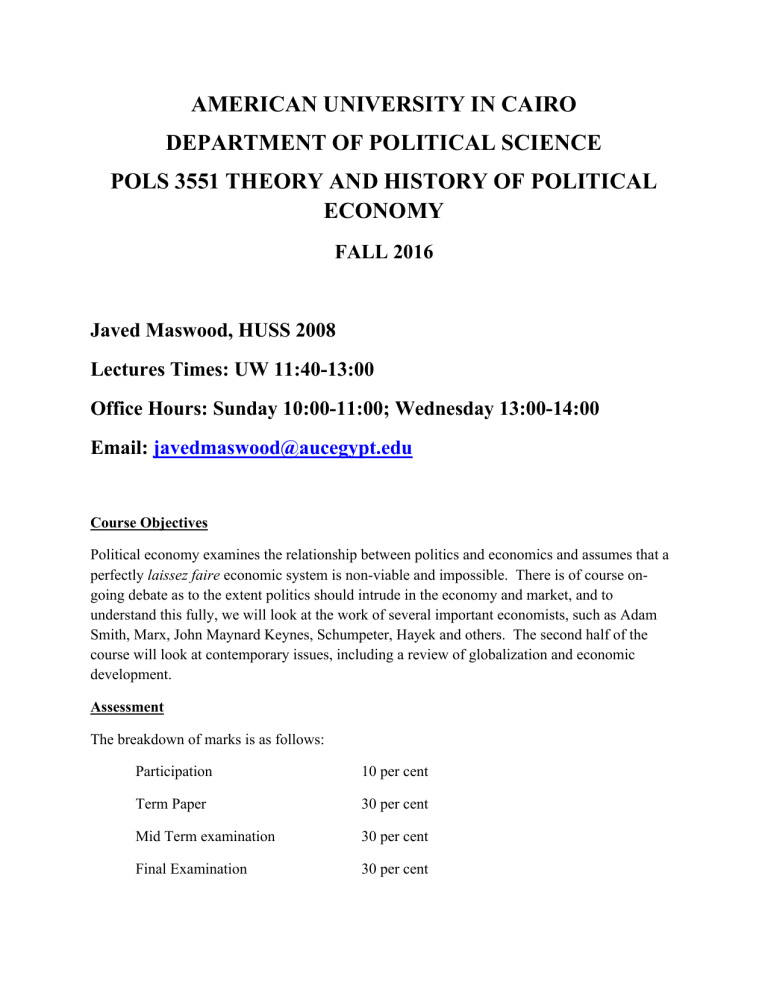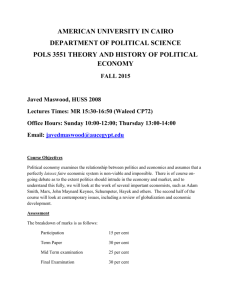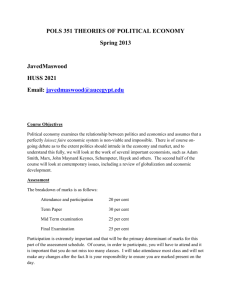
AMERICAN UNIVERSITY IN CAIRO DEPARTMENT OF POLITICAL SCIENCE POLS 3551 THEORY AND HISTORY OF POLITICAL ECONOMY FALL 2016 Javed Maswood, HUSS 2008 Lectures Times: UW 11:40-13:00 Office Hours: Sunday 10:00-11:00; Wednesday 13:00-14:00 Email: javedmaswood@aucegypt.edu Course Objectives Political economy examines the relationship between politics and economics and assumes that a perfectly laissez faire economic system is non-viable and impossible. There is of course ongoing debate as to the extent politics should intrude in the economy and market, and to understand this fully, we will look at the work of several important economists, such as Adam Smith, Marx, John Maynard Keynes, Schumpeter, Hayek and others. The second half of the course will look at contemporary issues, including a review of globalization and economic development. Assessment The breakdown of marks is as follows: Participation 10 per cent Term Paper 30 per cent Mid Term examination 30 per cent Final Examination 30 per cent Participation is extremely important and that will be the primary determinant of marks for this part of the assessment schedule. Of course, in order to participate, you will have to attend and it is important that you do not miss too many classes. I will take attendance on most class days and will not make any changes after the fact. It is entirely your responsibility to ensure you are marked present on the day and not ask for changes to the roll after the fact. However, there are no marks allocated for attendance, only for participation, but participation of course is dependent on regular attendance. Remember also that the University mandates that you are allowed to be absent for six lectures (3 weeks) whether for medical or other reasons. If you expect to be absent more than six lectures, you should consider withdrawing from course or risk a failing grade. Ask questions, whether in class or in my office. I am here to help in whatever way I can but you must take the initiative to approach me. Feel free to knock on my door, during or outside of office hours. The essay has to be structured around a hypothesis and it is advisable that you submit a statement of your hypothesis and its significance by mid March. This should be no more than a 100 words. Typically, the hypothesis itself will be one sentence long and should establish a causal link between two variables. An essay without a clearly stated hypothesis will not be accepted. A hypothesis is your educated guess or answer to a research question or puzzle. You must formulate the hypothesis yourself, but I am happy to provide feedback. The essay should be no more than 2000 words in length, not including references and bibliography. Do not use internet sources in your essay and rely instead only on published books and refereed journal articles. I do not accept any essay that is based on web sources. It is safest to avoid all www. citations. There are plenty of books in the library for your research needs. Essays must have proper referencing and provide evidence of research. There must be references to at least five different sources. Do not cite dictionaries, encyclopedias, or class notes. Students who plagiarize or cheat in any form will receive a grade of F for the course and be referred also to the University Academic Integrity Committee. THE ESSAY WILL BE DUE IN CLASS ON THE FIRST CLASS DAY OF NOVEMBER 2016. I DO NOT MIND LATE SUBMISSIONS AND THERE IS NO REASON TO ASK PERMISSION FOR MODERATELY LATE SUBMISSIONS BUT PLEASE BE AWARE THAT THE LATER THE SUBMISSION, THE HARDER MY EVALUATION CRITERIA. SO IF YOU TAKE LONGER TO COMPLETE YOUR ASSIGNMENTS, I EXPECT A BETTER QUALITY PAPER. ONLY EXCESSIVELY LATE PAPERS, SAY A WEEK BEFORE END OF TEACHING, WILL INCUR PENALTY Bring a hard copy of essay and the essay should be stapled without any plastic jacket or cover. NO TEXTING. PHONES MUST BE SWITHED OFF Academic Integrity Policy The University has a zero-tolerance policy on cheating and plagiarism. Academic integrity is important and you should abide by established policy and guidelines. You can read the code of ethics at http://www.aucegypt.edu/resources/academicintegrity/ Course Outline and Reading 1. Introduction to course 2. Political Economy: An introduction The Debate Within Economics 3. An Overview of the Debate Through History 4. Laissez Faire Economics : The Science of Adam Smith and Alfred Marshall Caporaso J. and David Levine, Theories of Political Economy, pp. 33-54 Brue, S. and Randy Grant, The Evolution of Economic Thought, pp 275-300 5. Challenge to Laissez Faire 1: Marxist political economy Brue, S. and Randy Grant, The Evolution of Economic Thought, pp. 171-92 6. Keynes and ‘Depression Economics’: Demand Management Cord, R., Reinterpreting the Keynesian Revolution, pp 1-11 Kindleberger, C., The World in Depression, Wheelock. David C., ‘Monetary Policy in the Great Depression: What the Fed Did and Why’, Federal Reserve Bank of St Louis, April 1992. 7. The Conservative Challenge: Schumpeter, Hayek and Friedman Brue, S. and Randy Grant, The Evolution of Economic Thought, pp. 497-503 8. Global Financial Crisis of 2008 and Neoclassical Rebuttal Krugman, P., End This Depression Now, 2013. Chapter 2. 9. MID TERM EXAMINATION Politics Weighs In 10. Political Economy in1970s and early 1980s: Islands of Theories, HST etc 11. Developmental States: Bringing the State Back In Ziya, O. “The Logic of the Developmental State” Comparative Politics, Oct 1991 12. Asian Financial Crisis and a Neo-Classical Consensus Maswood, S., "Developmental States in Crisis", in Beeson, M. (ed.), Reconfiguring East Asia: Regional Institutions and Organizations After the Crisis, Curzon, London, 2002. Maswood, S., International Political Economy and Globalization, pp 83-123 Issues in Contemporary Political Economy 13. Monetary and Fiscal Policy Lohmann, S., ‘The Non-Politics of Monetary Policy’ in Oxford Handbook of Political Economy. O’Connor, J., The Fiscal Crisis of the State, pp xiii-12, passim 14. Collective Action Theories Olson, M., The Logic of Collective Action, 1965. 15. Capitalism, Democracy and Development Przeworski, A., ‘Self-Enforcing Democracy’, in Weingast and Witman, The Oxford Handbook of Political Economy, 2008. Chapter 17. Iverson, T., ‘Capitalism and Democracy’, in Weingast and Witman (eds.). The Oxford Handbook of Political Economy, 2008, Chapter 33. 16. Capitalism, Inequality and the Kuznets Curve Pikety, T., Capitalism in the Twenty-first Century. Glaeser, E.L., ‘Inequality’, in Oxford Handbook of Political Economy. 17. Regional Integration: European Union Eichengreen, B. in Oxford Handbook of Political Economy. 18. Trade Stability and Protectionism Gilpin, R., The Political Economy of International Relations, Princeton University Press. Grossman, G.M. and Helpman, E., ‘Protection for Sale’, American Economic Review, Vol. 84, No. 4, 1994, pp. 833-850 19. Trade and Development Maswood, S., Trade, Development and Globalization, pp 1-30 20. Globalization Rodrik, D., The Globalization Paradox, pp. ix-23 Altman, Roger C., ‘Globalization in Retreat’, Foreign Affairs, July/Aug 2009 21. Environmental Politics and Global Warming Carter, N., The Politics of the Environment, 2nd edition, Cambridge University Press, 2007, chapters 8 and 9 22. Crises in the Global Economy: Role of Governments in Turbulent Times Rodrik, D., The Globalization Paradox, pp 207-232 23. Review




